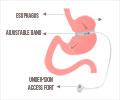Persistent organic pollutants (POPs) stored in body fat can be released into the bloodstream after significant weight loss, particularly after bariatric surgery.

Metabolic Signatures in Adipose Tissue Linking Lipophilic Persistent Organic Pollutant Mixtures to Blood Pressure Five Years After Bariatric Surgery Among Adolescents
Go to source).
These findings could eventually lead to treatments to reduce adverse health effects of exposure to these environmental chemicals on individuals with obesity, particularly for those pursuing weight-loss interventions such as bariatric surgery.
‘Did You Know?
Hypertension is a long-term risk associated with exposure to persistent organic pollutants (POPs), even in individuals who have undergone weight-loss surgery.’





Hypertension is a long-term risk associated with exposure to persistent organic pollutants (POPs), even in individuals who have undergone weight-loss surgery.’
Advertisement
Hidden Side Effect of Weight Loss Surgery
“While bariatric surgery is an effective treatment used to address severe obesity and improve cardiometabolic health, it also releases POPs stored in fat into the bloodstream,” says Shudi Pan, the study’s first author and a fourth year Ph.D. candidate in the Department of Population and Public Health Sciences at Keck School of Medicine of USC.Although their toxicity led many countries to start restricting the use of POPS more than 20 years ago, they remain a global health challenge since they persist for long periods in the environment. They have been detected at concerning levels worldwide even in regions where these chemicals were never manufactured or used.
Advertisement
Persistent Organic Pollutants: A New Risk for High Blood Pressure
“POPs are considered an emerging risk factor for hypertension and our study provided us a unique opportunity to evaluate the relationship between POPs exposure and blood pressure. Until now, few studies have examined how POPs exposures in adipose tissue affect blood pressure,” says Pan. “Similarly, the mechanisms underlying the relationship between POP mixtures and blood pressure have been unclear.”The study included data from 57 adolescents from the Teen-Longitudinal Assessment of Bariatric Surgery (Teen-LABS) consortium, who underwent bariatric surgery.
“We measured the level of POPs stored in adipose tissue before surgery. After, we assessed whether it affected blood pressure in the short term—at 6 months, and then five years after surgery,” says Pan.
Pan’s research found that POPs mixtures were linked to higher systolic blood pressure five years after bariatric surgery. Additionally, the researchers incorporated metabolomics to understand the underlying mechanisms of POP mixtures in adipose tissue on changes in blood pressure. Metabolomics refers to the study of metabolites which are small molecules or substances made when the body breaks down food, chemicals, or its own tissue—in this case the breakdown of body fat after bariatric surgery.
“Through a technique called high-resolution mass spectrometry, we assessed these metabolites, thousands at a time, to determine what complex biological changes were occurring that led to changes in blood pressure,” says Pan.
The researchers’ analysis revealed that one particular pathway involved in the production of prostaglandin was key in influencing blood pressure changes in the long-term, making this one of the first studies to identify a plausible rationale. Prostaglandin has long been proved to be involved in blood pressure regulation, and this study found that POPs modified prostaglandin pathways, contributing to disruptions in blood pressure regulations.
“While our study had a small sample size, we think the prostaglandin pathway is a key player in understanding the biological mechanism between POPs and the development of high blood pressure in this demographic and more research is needed to further understand this particular pathway linking POP exposures to blood pressure regulation,” says Pan.
Hypertension in Teens: A Path to Heart Disease in Adults
High blood pressure in adolescence is associated with an increased risk of cardiovascular disease and cardiovascular diseases mortality in adulthood. Interventions that can address early life hypertension can help reduce the risk of cardiovascular disease, which remains a leading cause of death worldwide.References:
- Metabolic Signatures in Adipose Tissue Linking Lipophilic Persistent Organic Pollutant Mixtures to Blood Pressure Five Years After Bariatric Surgery Among Adolescents - (https://pubs.acs.org/doi/10.1021/acs.est.4c13902)
Source-Keck School of Medicine of the University of Southern California












